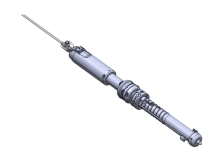Medinol has announced the first-in-human (FIH) implantation of the ChampioNIR drug-eluting peripheral stent system at Alfred Hospital in Melbourne, Australia.
This implantation demonstrated a new hybrid mechanical design aimed at enhancing patient outcomes and procedural success.
Related: InBrain Neuroelectronics announces first-in-human BCI procedure
The ChampioNIR stent system represents a transformative technology in peripheral stenting. Its structure combines a metallic component for radial support and a bioresorbable polymeric mesh for longitudinal flexibility.
This design ensures durability and adaptability within challenging anatomical regions. Additionally, the stent features an advanced drug-elution method that allows for extended therapeutic dosing of a ‘limus’ drug across large peripheral vessels.
The implantation was performed by Dr Gerard Goh and Dr Thodur Vasudevan, who are part of the CHAMPIONSHIP first in human study.
The Alfred Hospital interventional radiology head professor Gerard Goh said: “We were impressed with ChampioNIR’s deliverability and its straightforward deployment.
“The Frictionless Deployment Mechanism made the precise positioning of the stent very straightforward.”
This study aims to enrol 30 patients across seven sites in Australia and the US. The successful procedure in Melbourne is a promising start for this international clinical trial.
CHAMPIONSHIP study principal investigator professor Sahil Parikh said: “The ChampioNIR stent represents a breakthrough in treatment for SFA lesions.”
Medinol CEO Dr Yoram Richter said: “Medinol is excited to bring to clinical practice the culmination of years of research and development into novel stent designs, tailor-made for unmet clinical challenges in vascular interventions.”
Established in 1992, the company is engaged in the development of advanced solutions to improve the management of vascular diseases.
It has more than 300 employees and offices in the US and Israel.




